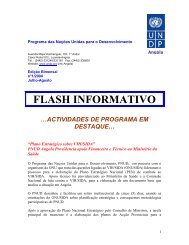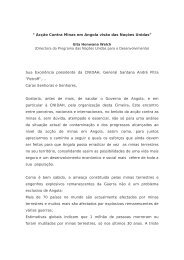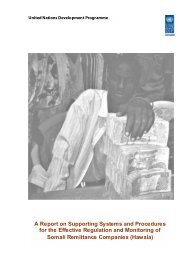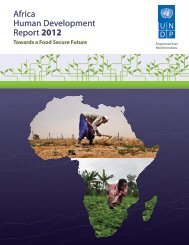CORRUPTION AND ANTI-CORRUPTION STRATEGIES ... - UNDP
CORRUPTION AND ANTI-CORRUPTION STRATEGIES ... - UNDP
CORRUPTION AND ANTI-CORRUPTION STRATEGIES ... - UNDP
You also want an ePaper? Increase the reach of your titles
YUMPU automatically turns print PDFs into web optimized ePapers that Google loves.
growth. The ICAC was well-resourced and used<br />
seconded and expatriate staff. It had intensive<br />
selection and training programmes and its public<br />
education programmes were excellent. While it<br />
was thus a relatively expensive model to emulate,<br />
it is worth noting de Speville's comment that<br />
the ICAC was not the strategy itself but was a<br />
mechanism for implementing the broader strategy<br />
that included the enforcement of the law and<br />
the winning of popular support.<br />
Mali and Senegal:<br />
Determinants of Customs Fraud<br />
David Stasavage and Cecile Daubree (Stasavage<br />
and Daubree, 1997) examined the determinants<br />
of customs fraud in the west African states of<br />
Mali and Senegal, which have many similarities<br />
in colonial heritage, state structure and political<br />
style, membership of the Franc Zone and<br />
protectionist policies. Customs fraud is an<br />
example of both loss of revenue and corruption.<br />
The fraud can be of various types, including<br />
under-declaration of the value of goods,<br />
misclassification and underpayment of taxes<br />
due. But in whatever form it occurs, it can have<br />
significant economic consequences for such<br />
developing states, as the revenue base of the<br />
state is highly dependent upon the efficient<br />
taxation of trade.<br />
Stasavage and Daubree used standard principalagent<br />
models as a basis for their research, although<br />
it was accepted that such models focus upon<br />
national-level factors and cannot predict results<br />
for specific customs administrations. Instead,<br />
they sought to compare fraud on a product-byproduct<br />
basis within customs administrations.<br />
Their general conclusions were that trade<br />
liberalisation had reduced levels of fraud and<br />
that pre-shipment inspection 'can be a powerful<br />
tool for reducing fraud'. In addition, to reduce<br />
customs fraud, donors should support institutional<br />
reforms that reduce the discretion of officials<br />
and improve monitoring. Customs fraud is<br />
itself a symptom of specific national political<br />
and institutional failures. Stasavage suggested<br />
that the size of public service salaries was less<br />
an issue in Mali and Senegal, when compared<br />
with other African countries. Instead, a key<br />
problem with the customs services in Mali<br />
and Senegal was the lack of funds for non-wage<br />
current expenditures, such as basic necessities<br />
(including fuel, vehicles and other administrative<br />
costs) for the officials to do their jobs. Furthermore,<br />
in both Mali and Senegal, changes in<br />
trade policies were related to the rise and<br />
decline of distinct business groups. Some<br />
groups of industrialists and merchants were<br />
losing the political clout to demand protection.<br />
Liberalisation was creating new business groups<br />
in the states, which were influencing policy.<br />
In relation to one major possible reform –<br />
the use of pre-shipment inspection firms –<br />
Stasavage argued that there was a tension<br />
between the costs of such expensive pre-shipment<br />
inspection services and the revenue thereby<br />
gained. The improvements secured by preshipment<br />
inspection services were in part based<br />
upon accompanying reforms in the customs<br />
services themselves, particularly improvements<br />
in information gathering and assessment and<br />
the computerisation of the services.<br />
Tanzania<br />
Ambassador Alexander Muganda (Muganda,<br />
1997) described the circumstances surrounding<br />
the establishment and the results of the<br />
Warioba report on corruption in Tanzania,<br />
which was appointed in January 1996 and<br />
reported in December 1996. J. S. Warioba,<br />
former Prime Minister and first Vice President,<br />
had chaired the Presidential Commission;<br />
Muganda had been both Secretary to the<br />
Commission and also the Director of the<br />
Prevention of Corruption Bureau in Tanzania.<br />
1994 was a “low water mark” in Tanzania due<br />
to corruption scandals, and the 1995 elections<br />
produced anti-corruption commitments. The<br />
Prevention of Corruption Bureau was ineffective,<br />
<strong>CORRUPTION</strong>& INTEGRITY IMPROVEMENT INITIATIVES IN DEVELOPING COUNTRIES<br />
5 3







